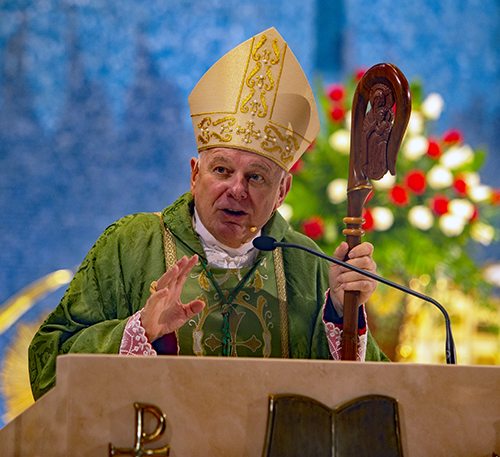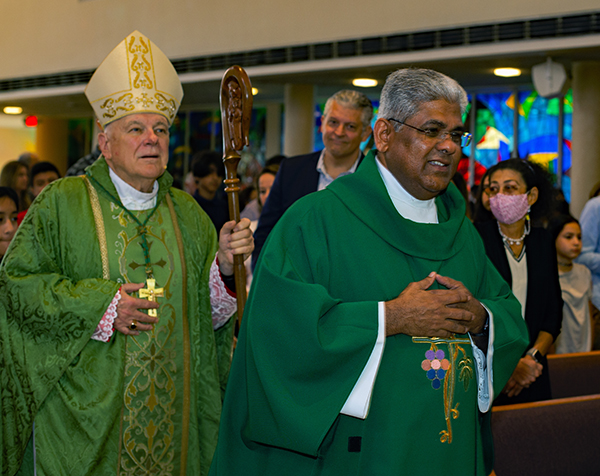By Archbishop Thomas Wenski - The Archdiocese of Miami
Archbishop Thomas Wenski preached this homily during a Mass marking the start of the 75th anniversary celebration for St. Rose of Lima Parish in Miami Shores. The Mass was celebrated Oct. 9, 2022, the 28th Sunday in Ordinary Time.
75 years! In a Church that is almost 2,000 years old, 75 years might not seem to be a big deal. But here in South Florida, where everything looks like it was built the day before yesterday, and in an archdiocese that on October 7th turned 64 years old, 75 years is certainly worth celebrating! And the Scriptures today are particularly relevant – for that which motivates us to celebrate is gratitude: gratitude for God’s blessings, gratitude for faith, gratitude for all that St. Rose of Lima Parish represents to us.
When I was a kid and happened to be in a bad mood or just didn’t like what I was asked to do, my mother would give me a look and say: Young man, I don’t like your attitude.

Photographer: MARLENE QUARONI | FC
Archbishop Thomas Wenski preaches the homily at the Mass that kicked off St. Rose of Lima Parish's 75th anniversary celebration, held Oct. 9, 2022 at the Miami Shores church.
As I said, the Scriptures today are particularly relevant, because the first reading and today’s Gospel, about the 10 lepers, are about attitudes.
In the first reading, we encounter Naaman, a rich and powerful Syrian, who had leprosy but is cured by Elijah.
In the Gospel, Jesus cures 10 lepers – and leprosy was a terrible disease, in the time of Elijah and in the time of Jesus, even up to modern times. You may have heard the story of Damien, the priest who gave his life serving a leper colony in Hawaii. Leprosy’s victims were shunned and feared. Thank God today it is almost disappeared – it is a disease that can be treated and cured.
But, in Elijah’s time and in Jesus’s time, it took a miracle to be cured of leprosy. That’s why Jesus told the 10 lepers he cured to go show themselves to the priests. Once their cure was verified, they no longer would be feared or shunned.
In the first reading, the prophet Elijah cured the Syrian Naaman – through the power of the God of Israel, which led him to praise God and to recognize that the God of Elijah, the God of Israel, was the true God. His attitude, which at first was an attitude of distain, became one of gratitude.
In the Gospel reading, 10 were cured by Jesus – but only one came back to thank him. His attitude was also one of gratitude. We can’t say the others weren’t happy about being cured. They probably went running to find their families, their loved ones, to show what had happened to them. They must have appreciated what Jesus did for them. But only one of them, a Samaritan, had an attitude of gratitude. Realizing that he had been cured, he returned praising God with a loud voice and fell at the feet of Jesus and thanked him.
That’s the attitude of gratitude we all should have; but often we don’t. People do good things for us; but we take it for granted. And we do take people for granted a lot. We take our parents and our spouses for granted, we take our coworkers for granted, we take our siblings, our friends for granted. Instead of showing an attitude of gratitude, too often we show an attitude of entitlement – it’s all about me. But the point of the Gospel is that it is not, it is not about me.
The attitude of gratitude that Jesus praises in the Gospel is what we should try to cultivate. If only one of the 10 lepers had it, it must not come naturally. We must work at it.
Now, every Sunday, the Christian community comes together to celebrate Mass. This is what generations of parishioners of St. Rose have been doing for almost 75 years. And at Mass we do what that Samaritan leper did: We praise God with a loud voice, and we fall at Jesus’ feet and thank him. Another word for Mass is “Eucharist” – and it means “thanksgiving.” At Mass, just like the lepers, we say, “Jesus, Master, have pity!” In fact, that’s how Mass begins: We acknowledge that we are sinners, and we pray: Lord, have mercy! Christ, have mercy!

Photographer: MARLENE QUARONI | FC
Archbishop Thomas Wenski and Father George Packuvettithara, St. Rose of Lima's pastor, enter the church for the Mass that kicked off the Miami Shores parish's 75th anniversary celebration, Oct. 9, 2022.
Our leprosy is not a disease of the skin, but a disease of the soul, a disease of the heart. And, just as the disease of leprosy separated the lepers from their communities, sin divides us, from God and from one another. When we are honest with ourselves and acknowledge our sins, we feel sorry, and we know that we need God to heal us by his forgiveness and mercy. In the Eucharist, we listen to God’s word. He gives good news: God loves us and does want to heal us. And so, we praise God with loud voices – and, on our knees we thank Jesus who shares his life with us in the communion of His Body and Blood.
A lot of times, going to Mass doesn’t excite us. We have many other things to do – and they are not necessarily bad things. And so, we might be like those nine lepers that cured by Jesus never thought to go back and thank him. We need that attitude of gratitude to remind ourselves that, as Catholics, Mass is so very important. In fact, going to Mass on Sundays (or on the vigil of Sunday) is what Catholics do. It’s what identifies us as Catholics.
Some people might say, going to Mass does not do anything for me. But they’re missing the point. Christian life is not “all about me.” We don’t go to Mass just for Jesus to do something for us, or even to entertain us. We go to Mass to recognize what Jesus has done for us, and so we go to Mass to do something for Jesus: to praise him, to glorify him, to thank him. But whatever we do for Jesus, he’ll give back more than we can ever give him. For, just like he told the 10th leper that his faith had saved him, he strengthens our faith and sends us out to tell the world how good God is.
So, when Sunday comes along, and your spouse, or your parents tell you to get dressed for Mass, if you’re going to show any attitude, make sure it’s an attitude of gratitude.

